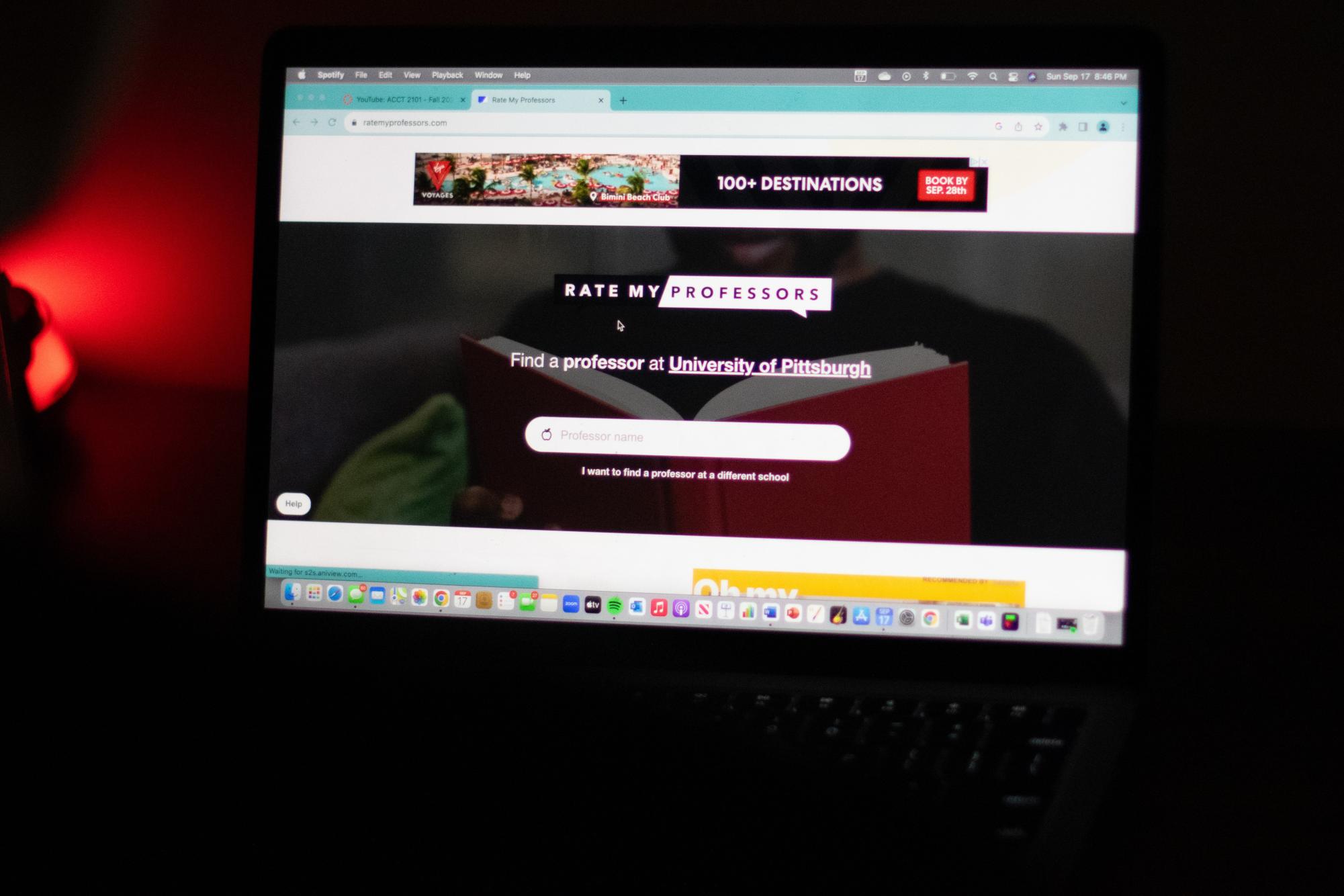‘It comes down to the individual’: Students share experiences with Rate My Professors


The Rate My Professors website on a laptop.
For sophomore Gabrielle Colasinski, using Rate My Professors before scheduling classes is necessary to her academic success.
“I use Rate My Professor any time I am looking for a class,” Colasinski, a statistics major, said. “It doesn’t decide whether or not I’ll actually take the class, [but] I just want to be prepared.”
Colasinski is one of many students who use the website to gather information about professors and the pros and cons of taking certain classes at the University.
According to their official website, Rate My Professors allows students to give their college professors feedback through personal reviews. The website then collects reviews and assigns each professor an average rating, “with positive and negative feedback for everyone to see.” Rate My Professors can also be used to rate colleges and universities in the United States, Canada, and United Kingdom. According to the website, Rate My Professors is “a popular tool in course selection.”
Colasinski said while she believes that most information about professors on the site is valid, there are always outliers.
“I would say that the ratings and reviews for professors are relatively accurate for the content of the course,” Colasinski said. “However, there’s usually always some people with very strong opinions or dislikes toward certain professors, which I usually ignore.”
According to Rate My Professors’ website, professor reviews are always anonymous. Professors have the ability to reply to reviews and “add clarifications as [they] see fit by registering for a professor account. While all website users have the ability to report ratings that violate site guidelines via the “report this rating” link at the bottom of the comment, Rate My Professors does not remove ratings “just because someone may disagree with it.”
Madison Piro, a sophomore pre-pharmacy major, said Rate My Professors reviews always influence her class choices.
“I’ve never actually written a review personally, but I’ve found it very helpful and pretty accurate, so I end up scheduling my classes based on the reviews of the professor,” Piro said. “I feel like a professor can make or break your grade in the class, so I always use it.”
However, for some students like Amy Chen, regularly using Rate My Professors is not a realistic option due to limited scheduling choices for their respective majors.
“I don’t use Rate My Professor too often because for most nursing classes, they only offer lectures at one time,” Chen, a sophomore nursing major, said. “We have a pretty set curriculum, so you don’t really get to pick your professor, or class for that matter.”
Chen said while she does not use Rate My Professors for her core nursing classes, she occasionally uses the website to find gen-ed classes.
“When I was registering for classes last spring, I originally planned to take an anthropology class,” Chen said. “However, the Rate My Professor reviews was not good for the particular class I was interested in, so I ended up registering for a public speaking class instead because the ratings for that professor were high.”
Chen believes that Rate My Professors reviews are often subjective to the student and contingent upon multiple factors.
“It definitely comes down to what your own preferences are for learning environment, assignment types, frequency of exams, and even the subject matter itself,” Chen said.
Shelby Hallman, a sophomore pre-pharmacy major, said Rate My Professors reviews play a large role in her decision to take, or not take, a class. However, she said she believes the site is only helpful in choosing classes part of the time.
“I use Rate My Professor every time I am picking my classes, and I know for a fact that all of my friends do as well,” Hallman said. “I do not think that the ratings are always necessarily accurate, and I think that it comes down to the individual.”
Chloe Troiano, a senior studying psychology, acknowledged that professor ratings can vary depending on the class that they are teaching.
“I’d say the ratings are pretty universal, especially if you look at the ratings for the specific classes that you are taking with the professor,” Troiano said. “Sometimes they will have bad ratings for one class and good ratings for another, so it’s definitely important to look.”
Like Chen, senior Caleb Nesbit uses Rate My Professors before taking classes not required for his majors.
“It plays a large role for classes that aren’t required for my degree,” Nesbit, a double major in psychology and communications, said. “If I look up a professor and they or the class have bad reviews, I won’t even put it in my shopping cart. However, when there is a required class taught by only one professor and they have bad reviews, there is no way for me to avoid the class, so I use the reviews to kind of prepare myself for the worst possible scenario.”
For Nesbit, using a nuanced approach to trusting professor reviews is best. Nesbit said although he’s found most information on classes to be accurate, he believes some reviews to be biased due to students’ struggling in challenging courses.
“I think that it’s important to keep in mind the type of class being taught,” Nesbit said. “STEM classes are typically some of the more difficult classes being offered at Pitt, meaning that a lot of students struggle and don’t do as well as they’d hoped. There’s a chance that a student upset about their grade bombed the professor and their average on the site.”
Nesbit said he does not find writing Rate My Professors reviews to be worthwhile, something that he believes other students should be aware of when reading reviews.
“I personally have never written a review,” Nesbit said. “I’ve gone to write some positive ones, but I usually don’t feel compelled until the end of the semester when I’m already swamped with real assignments. At that point, leaving a review feels like additional homework and by the time finals week ends, I don’t really care anymore. That’s something else people should probably keep in mind.”
Troiano said while she understands the occasional outlier reviews, she believes that writing Rate My Professors reviews is a great way to give professors feedback.
“I have written [reviews] for pretty much all professors I’ve had in all subjects,” Troiano said. “I’ve written both positive and negative reviews. I think it’s important to share a student’s opinion on a professor because they are the ones that are actually taking them.”
Recent Posts
SGB introduces new governing code bill and addresses rumors of ICE on campus
At its weekly meeting at Nordy’s Place on Tuesday, Student Government Board introduced an omnibus…
Opinion | School should be in the summer
Although this may be controversial, I believe that from this data, it is evident that…
Weathering the storm: Pittsburgh teams have tackled some of the toughest environments
The end of the year in western Pennsylvania is always marked by two things —…
Notes From an Average Girl // Notes on Book Banning
In this edition of Notes From an Average Girl, senior staff writer Madeline Milchman writes…
To Be Honest // Yup, it is that damn phone
In this edition of To Be Honest, staff writer Evin Verbrugge writes about her phone…
Meaning at the Movies | Portraying Toxic ‘Adolescence’
In this edition of Meaning at the Movies, staff writer Lauren Deaton explores the mini-series…

